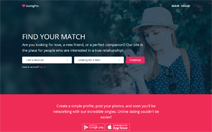The algorithms of dating platforms often give preference to more attractive users. Compatibility between partners is taken into account less.
A recent study spearheaded by experts from Carnegie Mellon University and the University of Washington has unveiled a notable trend in the realm of online dating, specifically focusing on dating platforms. Published in the prestigious journal Manufacturing & Service Operations Management, this research sheds light on the inherent biases present in the algorithms of these dating services.
The study meticulously analyzed data from over 240,000 users engaged in a leading dating pro platform in Asia. Spanning a period of three months, the research revealed a striking pattern: the algorithm of the dating platform appeared to favor users with higher attractiveness scores, thus indicating a popularity bias. This finding implies that users deemed more attractive are more likely to be recommended by the platform, overshadowing less popular counterparts.
Soo-Haeng Cho, the esteemed IBM Professor of Operations Management and Strategy at Carnegie Mellon’s Tepper School of Business, and a co-author of the study, highlighted the surge in online dating, especially during the COVID-19 pandemic. Despite the opportunities these platforms provide for connecting individuals, Cho emphasized the lingering concerns over the fairness and ethical aspects of their recommendation algorithms.
While users primarily join these platforms, including adult and mobile dating services, seeking potential matches, the companies behind these platforms have an overarching goal of revenue generation. This is achieved through various means, such as advertisements, subscriptions, and in-app purchases. Consequently, these platforms might prioritize user engagement over optimizing the chances of finding a perfect match.
To delve deeper into this dynamic, the researchers developed a model that examined the incentives for platforms to recommend popular users more frequently, with a focus on maximizing revenue or matches. They compared this with an unbiased approach where all users, regardless of popularity, have equal chances of being recommended. Their analysis unveiled a stark reality: unbiased recommendations could lead to reduced revenue and fewer matches for the platform. This is attributed to the role of popular users in boosting engagement and successful matches, provided they don’t become excessively selective.
Interestingly, the study noted that popularity bias tends to be lower in the early stages of a platform’s growth, where a high match rate can bolster its reputation and attract new users. However, as the platform evolves, the focus may shift towards revenue maximization, thus intensifying the popularity bias.
Musa Eren Celdir, a Ph.D. student at Carnegie Mellon’s Tepper School of Business and the lead author of the study, pointed out that online dating platforms can simultaneously increase revenue and improve users’ chances of finding suitable partners. He suggested that these platforms could leverage the study’s findings to enhance their recommendation systems and understand user behavior better.
Elina H. Hwang, Associate Professor of Information Systems at the University of Washington’s Foster School of Business and another co-author, emphasized the study’s contribution to understanding fairness and bias in recommendation systems. She noted that while the focus was on a specific dating platform, their model and analysis could apply to various other matching platforms.
In conclusion, the researchers advocated for greater transparency from online dating platforms regarding their algorithmic workings. They also underscored the need for further research into balancing user satisfaction, revenue goals, and the ethical design of algorithms.





